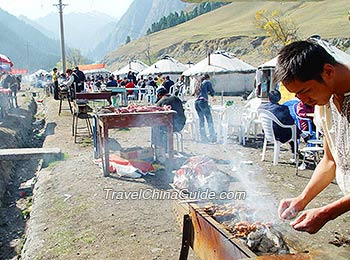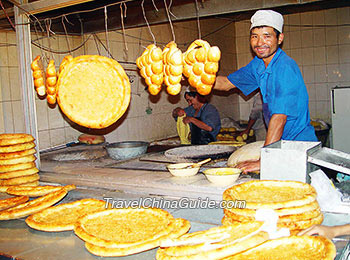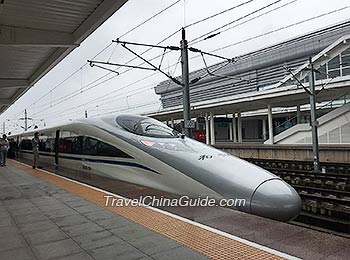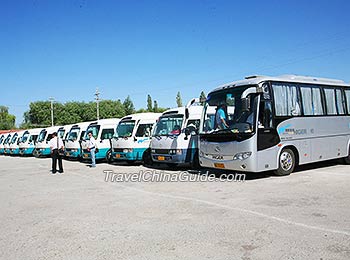Tips for Travelling along Silk Road
![]() Planning the Trip:tells you the best time to travel and what to pack.
Planning the Trip:tells you the best time to travel and what to pack.
![]() Special Tips:advice on visiting temples and families of ethnic groups, as well as money safety problem.
Special Tips:advice on visiting temples and families of ethnic groups, as well as money safety problem.
![]() Silk Road FAQs: Frequently asked questions about travel on the road
Silk Road FAQs: Frequently asked questions about travel on the road![]() Getting Acquainted
Getting Acquainted
Traveling along the old Silk Road can be a quite interesting and rewarding experience. Here is some information that the visitor should consider when planning a possible travel on the road.![]() Language
Language
While traveling along the road, the visitor can encounter about 20 different nationalities (ethnic groups) some of which, like the Uigur, Tibetan, and Mongolian speak their own language and have their own writing. Cultural exchange was considered very important during the development of the new unified national economy.
Some ethnic groups began learning Mandarin (the official Chinese language) and adopted the lifestyle of the Han people (the major ethnic group in China). Chinese became the official language in the autonomous regions. Today, Chinese can be easily used among these nationalities.![]() Accommodations
Accommodations
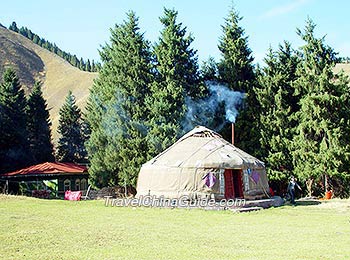 |
| Tent, Southern Pasture in Xinjiang |
In cities like Dunhuang, Turpan, Kashgar, Urumqi, Lanzhou, the visitor can enjoy high standard hotels named "Jiudian". They all provide excellent conditions, all-round services and they are quite safe. But this kind of hotels is also the most expensive. Visitors on a tight budget may consider the cheaper "Zhaodaisuo" (Guesthouse). With simpler facilities and basic service, these guesthouses are used by most Chinese travelers. In the remote villages only simple and rough lodgings are available. These locations offer nothing but a quite simple room.
On the Silk Road travelers will easily notice the Islamic influence on eating habits in northwest China. Visitors more interested in traditional Chinese food will have no problem in finding restaurants specializing in Sichuan, Cantonese and Beijing or Shanghai cuisine.
In every city night markets (ye shi) and small restaurants (xiao chi) are the best places to taste local snacks. Before you enter, remember to check the sanitary appearance of the restaurant. If you are puzzled with the food names on the menu, remember that the best way to order is by pointing to what other patrons are having or by going into the kitchen and picking out various meat and vegetable combinations. Remember that pork is forbidden in Islamic food.
|
|
Unlike people in other parts of China, in northwest China people often drinks tea with their meals or even when snacking a piece of bread. In restaurant, popular refreshments like Coca-Cola, beer and fruit juice are always available. You should try local drinks like kumiss, frozen yogurt and tea with milk.
Traveling along the Silk Road, is today much easier due to the recent developments of tourism and transportation infrastructure.
Albeit the most expensive, air travel is the most efficient and comfortable way to travel to the main cities along the Silk Road. The main cities Xi'an and Urumqi have international airports that offer frequent flights to all major Chinese cities as well as some international destinations. Local scheduled flights connect all major cities inside Xinjiang. For airline reservations and tickets you can visit the major airlines agencies open in all major cities. Moreover some large hotel can also book tickets for their guests.
For its convenience and inexpensiveness, trains are the favorite way to travel on the Silk Road. You can travel by train to Urumqi from Beijing, Xi'an, Lanzhou, Zhengzhou, Shanghai and Chengdu. Regular tickets are easy to buy while sleepers' tickets can only be bought in termini or major stations. Travelers making long journeys on train should carry with them enough food and drinks to cover the whole trip since, quite often, these items are sold out from Gansu westwards. Moreover toiletry items like towel, toothbrush, toilet paper etc. must be carried by the traveler since they cannot be bought on the train.
|
|
Buses are the most inexpensive method of transport along the Silk Road but, unfortunately, they are very slow. The three-day bus ride from Urumqi to Kashgar (with overnights in Korla and Aksu) is highly recommended for very active travelers, offering spectacular views of the Heavenly Mountains and glimpses of the oasis towns along the northern rim of the Taklamakan Desert.
Cars or mini-vans are offered by some travel agencies and hotels. A travel by car can be the only way to visit sites far from cities or towns that would otherwise be inaccessible. Rental prices are based on the number of days and kilometers traveled, and sometimes they can be negotiated.
The Beijing standard time, which is eight hours ahead of Greenwich Mean Time (London) and 13 hours ahead of Eastern Standard Time (New York), is the standard time used in China.
The visitor must know though that in Xinjiang, locals often use the Xinjiang time, which is two hours behind the standard Beijing time
Judy Bonavia, The Silk Road - from Xi'an to Kashgar, Odyssey, Hong Kong
This book introduces the history, natural conditions, remains, cultures and other facts about the road to visitors.
